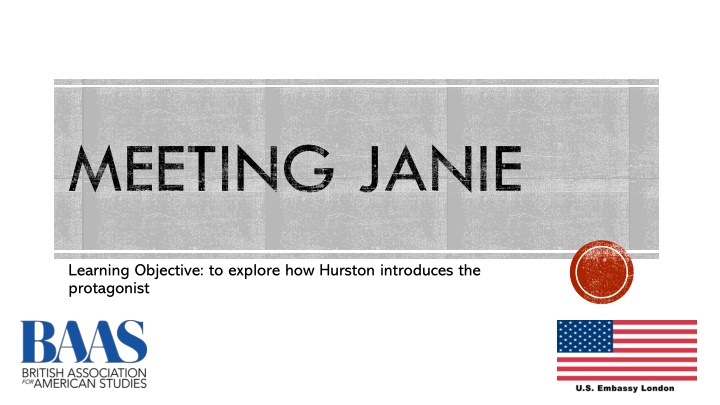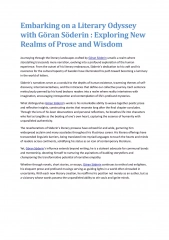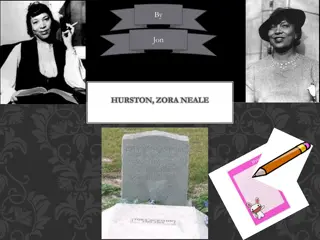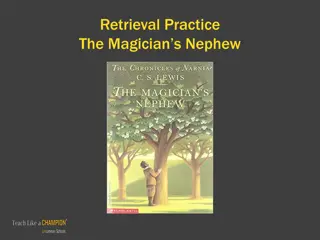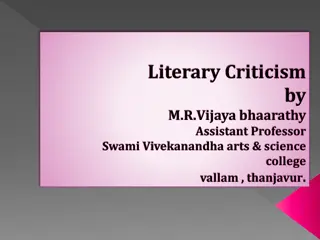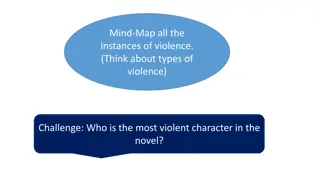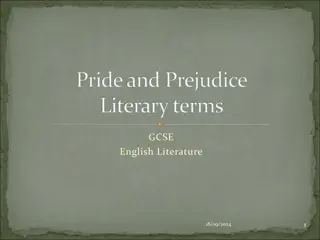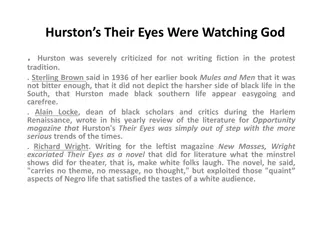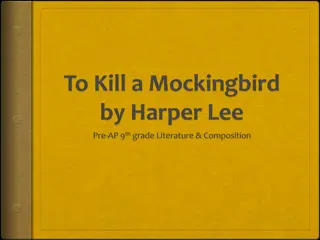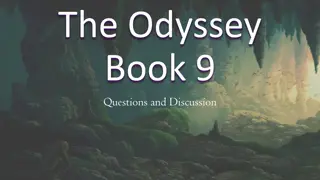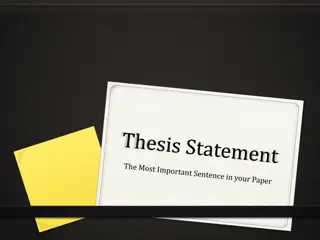Literary Exploration: Characters, Themes, and Narration in Hurston's Work
Delve into the intriguing narrative techniques employed by Hurston in her work, exploring character introductions, themes, and the unique perspectives presented. Reflect on the use of dialect, sociolect, and slang in novels, analyzing the impact on storytelling. Engage in discussions surrounding survival narratives and the reactions of individuals to traumatic experiences. Uncover insights into gender dynamics, feminism, and social observations woven into the narrative fabric.
Download Presentation

Please find below an Image/Link to download the presentation.
The content on the website is provided AS IS for your information and personal use only. It may not be sold, licensed, or shared on other websites without obtaining consent from the author.If you encounter any issues during the download, it is possible that the publisher has removed the file from their server.
You are allowed to download the files provided on this website for personal or commercial use, subject to the condition that they are used lawfully. All files are the property of their respective owners.
The content on the website is provided AS IS for your information and personal use only. It may not be sold, licensed, or shared on other websites without obtaining consent from the author.
E N D
Presentation Transcript
MEETING JANIE Learning Objective: to explore how Hurston introduces the protagonist
On your mini- whiteboards TITLE: MEETING JANIE If you wrote a novel If you wrote a novel Would you use dialect, sociolect or slang in your novel (YES/NO) Why (not) one main reason What might the advantages be? What might the disadvantages be?
THE SURVIVOR Literature is full of stories about in which one person who has been through an ordeal returns to a place he/she knows. Imagine a situation in which a person returns from a plane crash, a trip that went wrong, a flood, a storm how would people react? Would they be resentful, curious, scared? Would the person be changed? How?
WHILE READING How would you describe the narrative voice? What do we learn about Janie s ordeal? What first impressions do you have of her as a character? How are the people in the town described? Is this a feminist opening? What themes does this foreshadow? Do you agree with the differences between men and women which the narrator observes?
On your mini- whiteboards STARTER: Pick one quote from the opening you find Pick one quote from the opening you find Interesting Interesting or or Enigmatic Enigmatic
ON YOUR A3 PRINTOUTS Annotate the text in response to the question prompts on the slide Ships at a distance have every man s wish on board. For some they come in with the tide. For others they sail forever on the horizon, never out of sight, never landing until the Watcher turns his eyes away in resignation, his dreams mocked to death by Time. That is the life of men. Now, women forget all those things they don t want to remember, and remember everything they don t want to forget. The dream is the truth. Then they act and do things accordingly. So the beginning of this was a woman and she had come back from burying the dead. Not the dead of sick and ailing with friends at the pillow and the feet. She had come back from the sodden and the bloated; the sudden dead, their eyes flung wide open in judgment. The people all saw her come because it was sundown. The sun was gone, but he had left his footprints in the sky. It was the time for sitting on porches beside the road. It was the time to hear things and talk. These sitters had been tongueless, earless, eyeless conveniences all day long. Mules and other brutes had occupied their skins. But now, the sun and the bossman were gone, so the skins felt powerful and human. They became lords of sounds and lesser things. They passed nations through their mouths. They sat in judgment. Seeing the woman as she was made them remember the envy they had stored up from other times. So they chewed up the back parts of their minds and swallowed with relish. They made burning statements with questions, and killing tools out of laughs. It was mass cruelty. A mood come alive, Words walking without masters; walking altogether like harmony in a song. What she doin coming back here in dem overhalls? Can t she find no dress to put on? Where s dat blue satin dress she left here in? Where all dat money her husband took and died and left her? What dat ole forty year ole oman doin wid her hair swingin down her back lak some young gal? Where she left dat young lad of a boy she went off here wid? Thought she was going to marry? Where he left her? What he done wid all her money? Betcha he off wid some gal so young she ain t even got no hairs why she don t stay in her class? When she got to where they were she turned her face on the bander log and spoke. They scrambled a noisy good evenin and left their mouths setting open and their ears full of hope. Her speech was pleasant enough, but she kept walking straight on to her gate. The porch couldn t talk for looking. The men noticed her firm buttocks like she had grape fruits in her hip pockets; the great rope of black hair swinging to her waist and unraveling in the wind like a plume; then her pugnacious breasts trying to b ore holes in her shirt. They, the men, were saving with the mind what they lost with the eye. The women took the faded shirt and muddy overalls and laid them away for remembrance. It was a weapon against her strength and if it turned out of no significance, still it was a hope that she might fall to their level some day. But nobody moved, nobody spoke, nobody even thought to swallow spit until after her gate slammed behind her.
THE OPENING Ships at a distance have every man s wish on board. For some they come in with the tide. For others they sail forever on the horizon, never out of sight, never landing until the Watcher turns his eyes away in resignation, his dreams mocked to death by Time. That is the life of men. Now, women forget all those things they don t want to remember, and remember everything they don t want to forget. The dream is the truth. Then they act and do things accordingly. What tone is used here? Who is the Watcher ? Is this meant to provoke? To make readers think? Is it meditative or controversial? Is it mystical? The world is being personified here in what type of literature / tales is this also the case? What type of storytelling might Hurston be evoking here?
MEETING JANIE So the beginning of this was a woman and she had come back from burying the dead. Not the dead of sick and ailing with friends at the pillow and the feet. She had come back from the sodden and the bloated; the sudden dead, their eyes flung wide open in judgment. How would you explain the idea of judgement here? What could the eyes symbolize (title!)? How do these sentences shape your first impressions of the protagonist? Why would Hurston have chosen to do this?
THE ENCOUNTER The people all saw her come because it was sundown. The sun was gone, but he had left his footprints in the sky. It was the time for sitting on porches beside the road. It was the time to hear things and talk. These sitters had been tongueless, earless, eyeless conveniences all day long. Mules and other brutes had occupied their skins. But now, the sun and the bossman were gone, so the skins felt powerful and human. They became lords of sounds and lesser things. They passed nations through their mouths. They sat in judgment. Seeing the woman as she was made them remember the envy they had stored up from other times. So they chewed up the back parts of their minds and swallowed with relish. They made burning statements with questions, and killing tools out of laughs. It was mass cruelty. A mood come alive, Words walking without masters; walking altogether like harmony in a song. What she doin coming back here in dem overhalls? Can t she find no dress to put on? Where s dat blue satin dress she left here in? Where all dat money her husband took and died and left her? What dat ole forty year ole oman doin wid her hair swingin down her back lak some young gal? Where she left dat young lad of a boy she went off here wid? Thought she was going to marry? Where he left her? What he done wid all her money? Betcha he off wid some gal so young she ain t even got no hairs why she don t stay in her class? When she got to where they were she turned her face on the bander log and spoke. They scrambled a noisy good evenin and left their mouths setting open and their ears full of hope. Her speech was pleasant enough, but she kept walking straight on to her gate. The porch couldn t talk for looking. The men noticed her firm buttocks like she had grape fruits in her hip pockets; the great rope of black hair swinging to her waist and unraveling in the wind like a plume; then her pugnacious breasts trying to bore holes in her shirt. They, the men, were saving with the mind what they lost with the eye. The women took the faded shirt and muddy overalls and laid them away for remembrance. It was a weapon against her strength and if it turned out of no significance, still it was a hope that she might fall to their level some day. But nobody moved, nobody spoke, nobody even thought to swallow spit until after her gate slammed behind her. How is the relation between Janie and the people of the town presented here? What can you infer about her position in society? What can you infer about her character? What are the main figurative elements in Hurston s style that you notice? What is their effect? Some important themes of the novel are alluded to here, such as slavery, sexism, community / exclusion. Find examples of each theme. How are they introduced?
IN THIS OPENING, HOW DOES HURSTON COMMENT ON THE CONTEXT OF HER TIME? She alludes to issues such as . She takes sides when On the theme of gender, she suggests that . The memory of slavery comes through when .Hurston seems to suggest that .
TAKING STOCK: HOW WOULD YOU DESCRIBE JANIE SO FAR? 3 precise nouns 3 precise adjectives 1 simile 1 metaphor On your mini- whiteboards Extension task / homework: How does Hurston introduce the protagonist? How does Hurston introduce the protagonist?
So far: would you want to be So far: would you want to be Janie s friend? Why (not)? Janie s friend? Why (not)? FRIENDSHIP LO: to explore how Hurston presents Janie s and Pheoby s friendship
READ UP TO THE END OF CHAPTER 1 What do you learn about What do you learn about Janie Janie Phoeby Phoeby Tea Cake Tea Cake On your mini- whiteboards
HOW DOES THE NARRATOR PRESENT THE DARKNESS IN WHICH PHOEBY AND JANIE ARE TALKING? Quotes Hunt! Collect quotes referencing the darkness Copy them down and annotate them in as much detail as you can Write a paragraph in response to the question Write a paragraph in response to the question Prepare by setting yourselves targets, using the skills journey provided Why did Hurston decide to open the novel in the evening and at night time? What Why did Hurston decide to open the novel in the evening and at night time? What mood and ambience does this create? What might it symbolize? mood and ambience does this create? What might it symbolize?
CHECK! WHAT? WHAT? Topic sentence in your own words, introducing an argument use connectives to link your ideas HOW? HOW? discuss higher-level literary techniques WHY? WHY? Evaluate context Use precise diction
(UN)BELONGING Is Janie introduced as an insider or an outsider? Does friendship outweigh judgement and exclusion, or the other way around?
QUESTIONS FOR DISCUSSION: Based on the first chapter, what do you think some of the conflicts in the novel are going to be? What do you think the themes might be? Cite evidence from the text to support your predictions. Describe the town s attitude towards Janie. Describe her attitude towards the town. How does the communal dialogue help establish the town as a character? On page 7, Janie tells Pheoby, Unless you see de fur, a mink skin ain t no different from a coon hide. Based on context clues, what do you think this saying means? Hurston frequently uses personification in her descriptions of the natural world. Find one example of personification from the first chapter.
HOMEWORK Read chapter 2 (pages 10-23) What does Janie remember/know about her parents? What childhood incident revealed to her her racial identity? Why was she nicknamed "Alphabet," and what result does this have? What forms of awakening are associated with the pear tree and spring? What does Janie desire from life? What alarms and motivates Janie's grandmother? What do we learn about the old woman's past and the circumstances of her daughter's birth? What have been the chief motivations of her grandmother's life?
